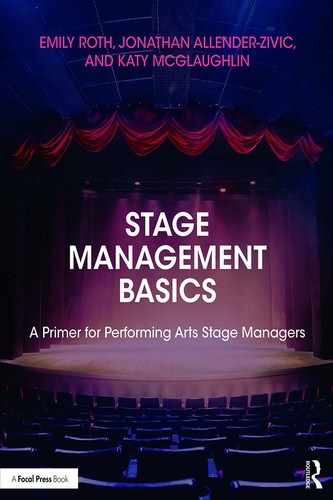Standby
Stage management is a field that takes time and experience to really learn, but the information contained in this book should lay the groundwork for the basic building blocks of a successful stage manager. A lot of becoming a good stage manager is learning to work collaboratively with many different personality types. Learning to communicate clearly and concisely will save you many headaches down the road.
As made clear by the previous chapters, much of stage management as a job is endless logistics, flawless organization, and stellar communication. However, all of these things can be learned, practiced, improved upon, and perfected with each new show. Even the personality traits discussed in the first chapter exist on a sliding scale. Some directors work best when allowed to do some of their own organizing, while others will need you to micromanage their whole lives in order to keep their heads on straight. Some actors need a firm, commanding hand with clear rules and tangible consequences. Other actors may need a little coddling and an open ear to listen to their frustrations. Some designers need strict deadlines and many little reminders, while others will shrink away from constant nagging and be less efficient as a consequence. Your particular traits will mesh perfectly with certain teams while another stage manager may be a better fit for others. These are not what define a great stage manager.
What separates a decent stage manager from a truly great one on any production is drive and joy. Each new production should be a thrilling prospect—a chance to practice and improve your skills, pick up new ones, and to tackle new, unexpected challenges. If you cannot love your work, stage management is a job you will quickly come to resent and none of the stress will be worth the reward. It will be difficult at times—scheduling may seem unmanageable, an actor may never seem to learn their lines, and each hurdle you overcome may lead to three more you didn’t see coming. But the joy of looking back, seeing all that the production was able to overcome, and being such a critical part of a team that puts together something beautiful and meaningful makes the whole process worthwhile.
The back of this book contains a lot of additional information that will help you grow as a stage manager. We highly suggest you take the time to look through the appendices and additional resources in detail. Use the examples as a jumping-off point for your own forms and templates. Read the suggested books to grow and expand your knowledge base to make you a better stage manager and theatrical artist/collaborator. Remember that you can always grow and learn new things; never stop learning, never stagnate or stop evolving the way you do things, and most importantly, never stop enjoying the work that you do—take pride in it and have fun.
GO!
